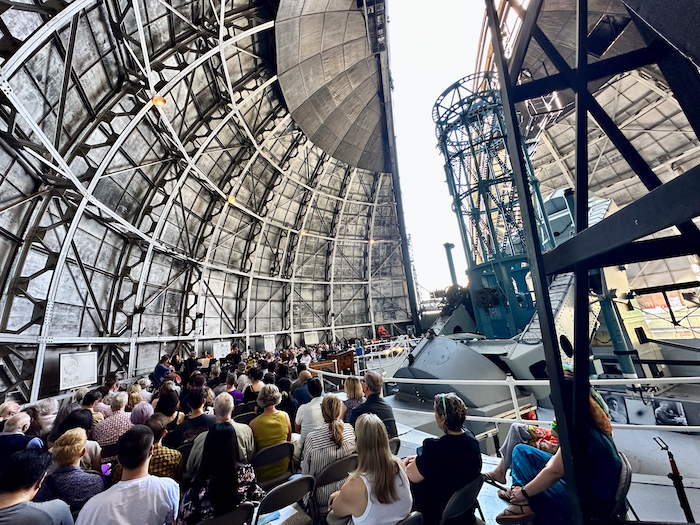A string concert in the Mount Wilson Observatory dome; a Zoom lecture on gravity and space travel presented by Santa Monica College’s John Drescher Planetarium; and stargazing, astro-themed pub trivia and talks on galaxies brought to you by Caltech at Dog Haus Biergarten in Pasadena — it’s time to get your space nerd on!

MOUNT WILSON OBSERVATORY’S
SUNDAY AFTERNOON CONCERTS IN THE DOME
PRESENTS “STRINGS ATTACHED!”
Featuring String Trios and Quartet with Cécilia Tsan,
Ambroise Aubrun, Allan Hon and Kate Hamilton
Sunday, Sept. 8, 2024
Mount Wilson Observatory — the place where humankind discovered its place in the universe — is pleased to announce the fifth date in its Sunday Afternoon Concerts in the Dome six-month series. “Strings Attached!” will grace the observatory with its string trios and quartet performing in the remarkable acoustics of the dome of the 100-inch telescope at the Observatory.
The same concert will be offered twice: first at 3 p.m. and again at 5 p.m.
The program will include String Trio in B Flat, D 47 by Franz Schubert, String Trio (2023) by Todd Mason, and String Quartet No.2, Op.35 for violin, viola and two cellos by Anton Arensky.
Each year, the six-month series featuring classical or jazz programs, is thoughtfully curated by Artistic Director Cécilia Tsan (Principal Cellist, Long Beach Symphony). An artist reception with light fare and refreshments is offered between the performances. Tickets cost $60 each and are available for purchase online in advance (highly recommended) or at the door, given availability.
For more information on the concert series, visit https://www.mtwilson.edu/concerts, where tickets for this and future concerts are available. Next concert is Oct. 6.
Photo credit: Melissa Dougherty/Mount Wilson Observatory
SANTA MONICA COLLEGE’S JOHN DRESCHER PLANETARIUM — FREE & ONLINE
Santa Monica College’s John Drescher Planetarium continues its Friday evening events in September with free, live virtual shows presented online at smc.edu/planetarium. This month’s shows take a look at what light is, explain equinoxes and solstices and, by audience request, explore gravity and its effects on space travel.
The Friday shows are at 8 p.m. and are preceded by a streamlined virtual digest of the popular Night Sky Show at 7 p.m., offering the latest news in astronomy and space exploration. The shows include the chance to chat with the planetarium lecturers and ask questions.
Planetarium lecturers are currently using the Zoom platform to present shows while SMC’s new planetarium and observatory are under construction. Free Zoom software is available for download at zoom.com.
The September shows are:
• Friday, Sept. 13, at 8 p.m. (following The Night Sky Show at 7 p.m.): “Light” — Planetarium Lecturer Sarah Vincent. Is light a particle? Is it a wave? The answer is: Yes. Almost everything astronomers know about the universe was learned from light. From radio light to gamma-ray light, every part of the electromagnetic spectrum reveals different pieces of the cosmological puzzle. But what is light? Free. Zoom at smc.edu/planetarium.
• Friday, Sept. 20, at 8 p.m. (following The Night Sky Show at 7 p.m.): “TILT! Equinoxes and Solstices Explained” — Planetarium Lecturer Jim Mahon. Most city dwellers are only vaguely aware of the rhythms of the sky and what the equinoxes and solstices actually are. In anticipation of the 2024 Autumnal Equinox on Sept. 22, tonight’s show will try to remedy this disconnect from the natural world, as well as dispel some myths, like that egg-standing-on-end story…. Free. Zoom at smc.edu/planetarium.
• Friday, Sept. 27, at 8 p.m. (following The Night Sky Show at 7 p.m.): “Gravity” (audience request) — Planetarium Lecturer Sarah Vincent. Planets orbit the Sun; moons orbit planets. Astronauts orbit Earth in the International Space Station, where they float weightless…but contrary to common phrasing, they are not in “zero G.” Tonight’s show explores orbital mechanics and the puzzle of why it’s “easier” to send a spaceship out to Jupiter than in toward the Sun. Free. Zoom at smc.edu/planetarium.
More information is available at smc.edu/planetarium.
ASTRONOMY ON TAP
Monday, Sept. 16
7:30 p.m. to 9:30 p.m.
The Formation of the Milky Way and Its Environment
Ekta Patel, NASA Hubble Fellow, University of Utah
Rohan Naidu, NASA Hubble Fellow, Massachusetts Institute of Technology
How did the Milky Way form? What can we learn about nearby galaxies by rewinding their orbits in time? Join us as we discuss these topics and more at our next Astronomy on Tap. We’ll host two ~20 minute talks, Q&A and then follow it up with interactive, astronomical pub trivia, live rock music and guided stargazing with telescopes!
7:30 p.m. – Rewinding the Orbits of Nearby Galaxies
8:15 p.m. – The Milky Way: A Galaxy of Immigrants
9 p.m. – Astro-themed Pub Trivia Answers and Prizes
Astronomy on Tap is a global phenomenon where professional astronomers give informal science talks in local bars with accompanying pub trivia and interactions with the public. Scientists at Caltech organize the Los Angeles Chapter of Astronomy on Tap one Monday a month. We host these free events which are open to all at the outdoor patio of the Dog Haus Biergarten in Old Town Pasadena (with inexpensive parking structure one block away).
Each event consists of two ~20-minute informal science talks given by researchers in astronomy, physics, and space science followed by Q&A. In the intermission periods, we have guided stargazing with telescopes, astro-themed pub trivia, and live music from Jason Achilles and Forrest Mitchell. Event is free and open to all. No reservations necessary. For more information and recordings of past events, please see the Caltech Astro Outreach website and the Caltech Astro YouTube page.





